Israel unleashes more airstrikes on Gaza Strip, after deadliest single attack so far
Israel has vowed to continue the offensive for "as long as necessary."
LONDON -- Israeli warplanes continued to bombard the neighboring Gaza Strip on Monday, a day after carrying out the deadliest single attack there in the latest outbreak of violence between Israel's military and Hamas, the Palestinian militant group ruling the blockaded territory.
The Palestinian Ministry of Health said at least 42 people in Gaza City were killed by Israeli airstrikes early Sunday. The attack levelled buildings and targeted roads leading to a hospital, preventing ambulances from reaching the wounded. Medical doctors were among the dead, according to the health ministry, which called on the international community to protect the already fragile health system in the Gaza Strip.
In total, 212 people -- including 61 children and 36 women -- have died in the Gaza Strip since tensions escalated last week. About 1,305 others have been injured so far, according to the health ministry.
In a televised address on Sunday, Israeli Prime Minister Benjamin Netanyahu vowed to continue the offensive at "full-force" and for "as long as necessary," saying his country "wants to levy a heavy price" on Hamas.
Hamas has also shown no signs of backing down, with its exiled leader, Ismail Haniyeh, telling a pro-Palestine rally in Qatar's capital on Saturday that "the resistance will not give in."
"The enemy is destroying homes and towers and carrying out massacres, thinking they will create deterrence against the resistance and the people of Gaza," Haniyeh said. "But they were wrong."
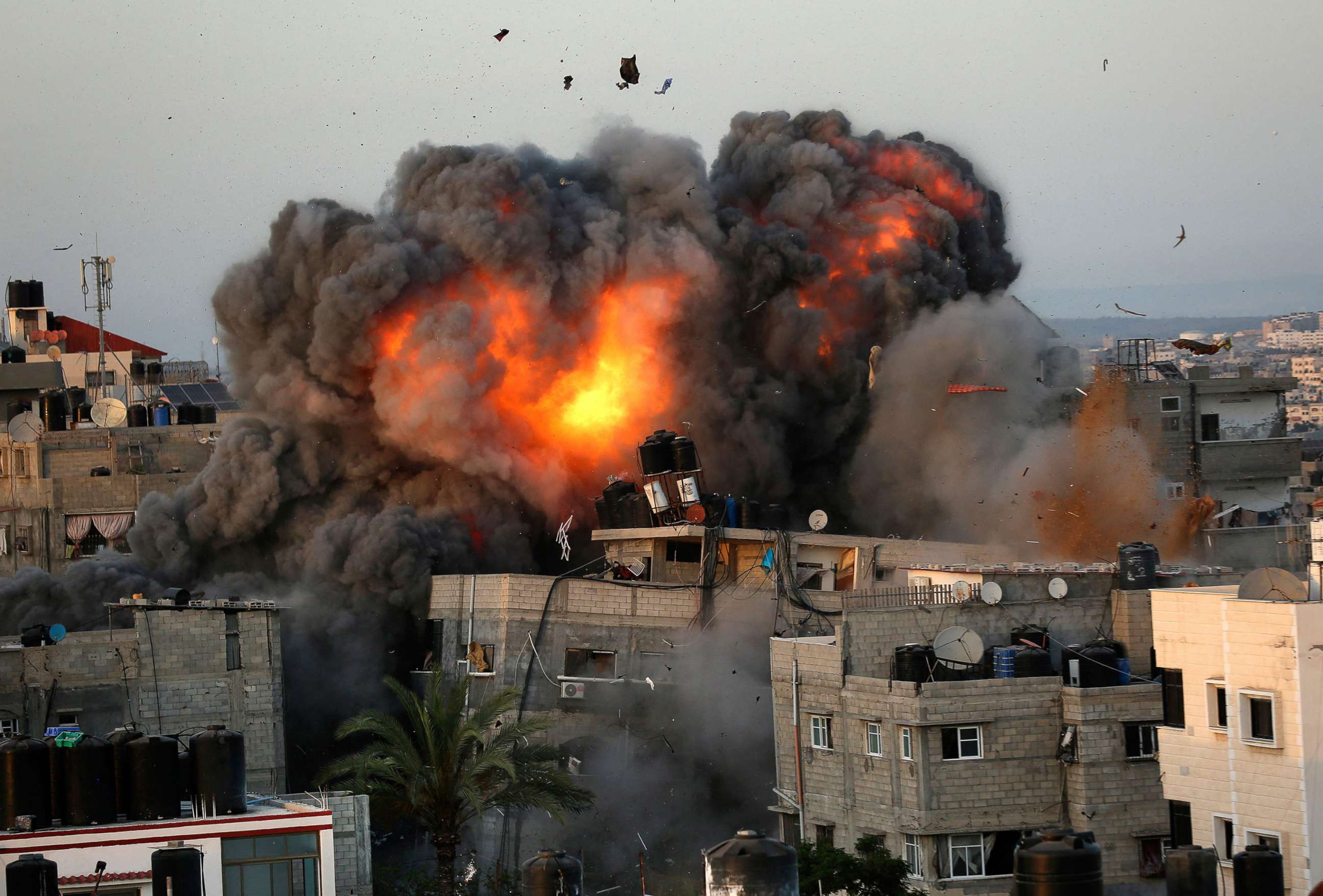
The latest round of fighting was triggered by recent clashes between Palestinian protesters and Israeli police in and around Jerusalem's Old City amid rising tensions over the potential eviction of several Palestinian families.
Hundreds of people were injured earlier this month after Israeli officers fired tear gas and stun grenades at Palestinian demonstrators who hurled rocks and chairs outside the Al-Aqsa Mosque, the third holiest site in Islam. Then Hamas, which gained a majority in the 2006 Palestinian legislative elections and took control of the Gaza Strip in 2007 after battling rival Palestinian forces, started firing a barrage of rockets toward Israeli territory on the night of May 10. In response, the Israel Defense Forces began unleashing airstrikes aimed at what it said were Hamas and other terror targets in the Gaza Strip, a 140-square-mile territory where 2 million Palestinians have lived under a blockade imposed by neighboring Israel and Egypt since Hamas seized power.
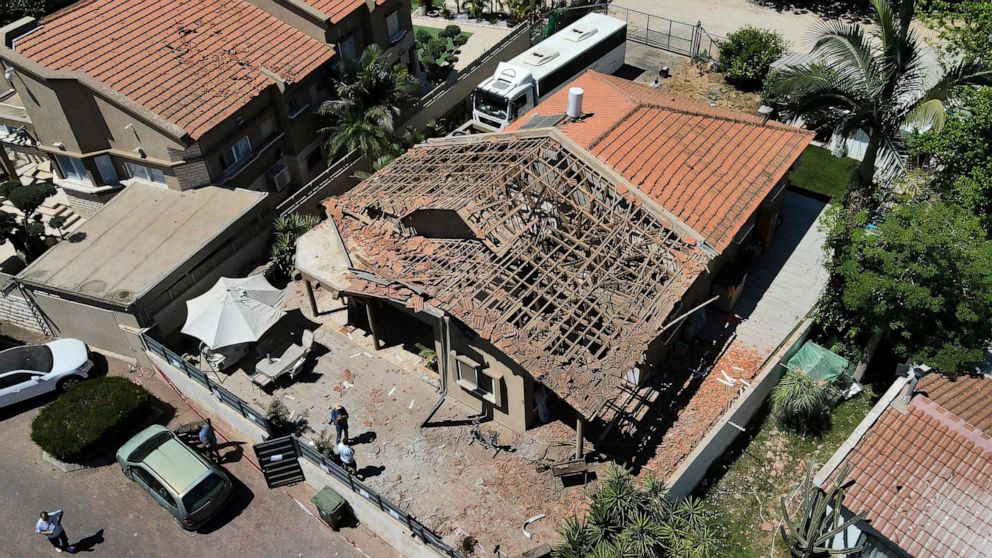
The IDF said that Hamas and Islamic Jihad, a smaller Palestinian militant group, have fired more than 3,150 rockets from the Gaza Strip into southern and central Israel since May 10, of which approximately 450 misfired and exploded inside the Palestinian territory. Israel's air defense system, known as the Iron Dome, has intercepted about 90% of the rocket attacks, according to the IDF.
The rockets were aimed at various Israeli cities, including Jerusalem and Tel Aviv, with some striking multiple homes as well as a school, a hospital and a bus. A total of 10 people, including a soldier and a 6-year-old child, have died in Israel, according to the IDF, which said hundreds of others have been wounded, at least 50 critically, according to the IDF.
"The fact that there aren't more casualties in Israel does not mean that Hamas isn't trying to kill Israeli civilians," the IDF said in a statement on Friday. "It simply means that the IDF is preventing them from doing so at an incredible level. The Iron Dome Aerial Defense System and easily-accessible bomb shelters all over Israel have saved thousands of lives. IDF troops will continue to work 24/7 to defend Israeli civilians at the highest level possible and minimize Gazan casualties wherever possible."
Hamas, claiming to be defending Jerusalem, has said that Israel bears responsibility.
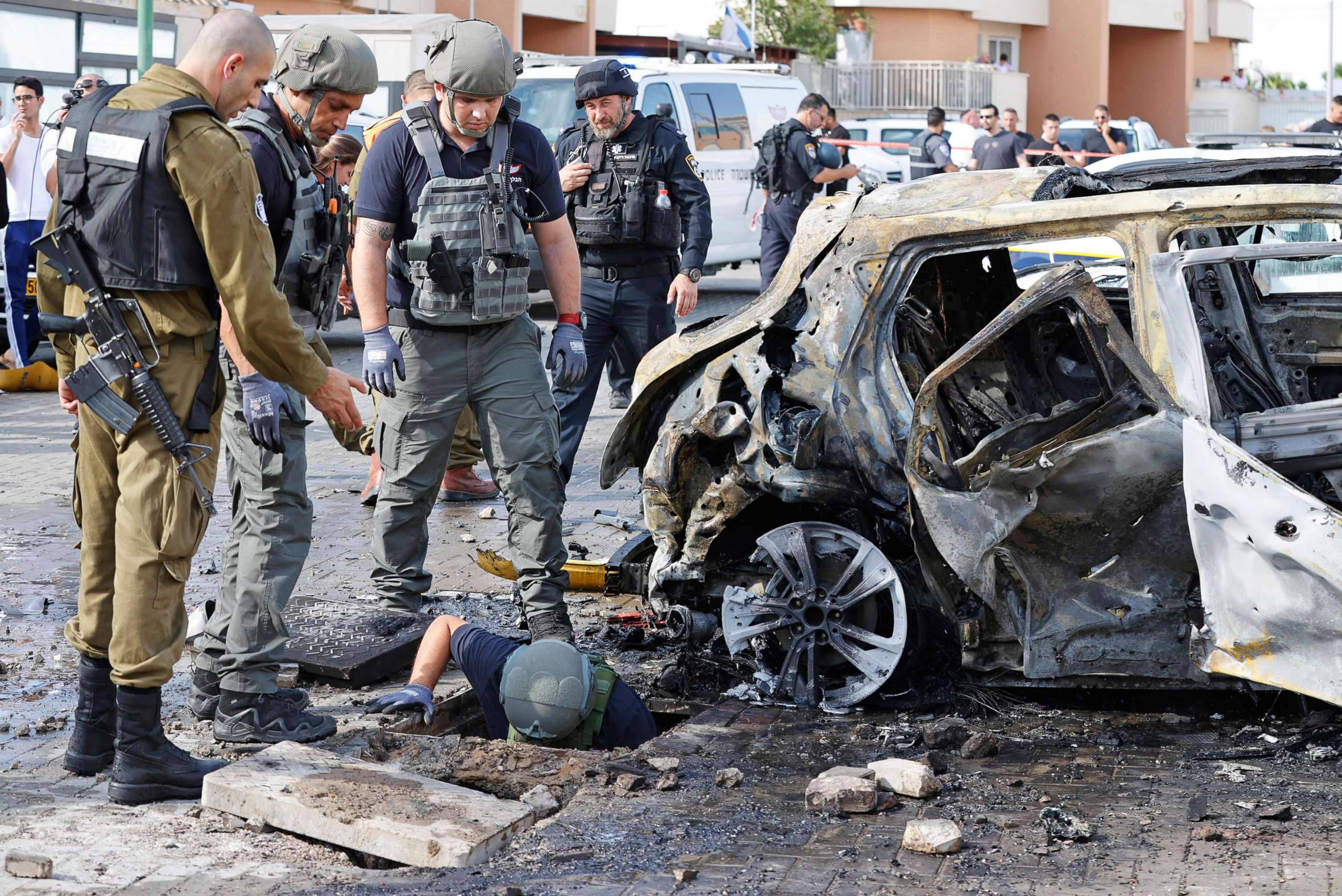
Meanwhile, the Israeli military has conducted about 1,450 airstrikes on the Gaza Strip since May 10, according to the Palestinian Ministry of Health, which said the attacks are targeting densely populated residential areas and have destroyed more than 1,000 houses and apartments as well as dozens of government buildings, schools and businesses. Some 40,000 families have been displaced so far, the health ministry said, calling for necessary supplies to prevent the spread of COVID-19 in overcrowded shelters.
Unlike Israel, the Gaza Strip has no air raid sirens or bomb shelters. However, the IDF has said it warns people to evacuate before striking targets in civilian areas.
International aid group Doctors Without Borders, better known by its French acronym MSF, said its team on the ground is working 24-hour shifts to support medical staff at a hospital in Jabalia, north of Gaza City, where they are treating dozens of patients with deep wounds and severe burns daily.
"The horrendous attacks on civilians and civilian infrastructure that we are witnessing in Gaza are inexcusable and intolerable," Ely Sok, MSF’s head of mission in the occupied Palestinian territories, said in a statement Monday. "The situation is critical. The number of wounded and displaced people is mounting while additional humanitarian personnel and supplies still cannot enter Gaza. The local health authority is reporting being 24 hours away from running out of blood bags, meaning they cannot transfuse patients with blood, a key intervention in caring for war wounded."
Mohammed Thabet, a spokesperson for the Gaza Strip's electricity distribution company, told ABC News that residents only have access to power for three to four hours per day now, due to the damage that the electrical grid has sustained over the past week of Israeli airstrikes. He said fuel supplies are also getting dangerously low and it's only a matter of days before the territory runs out of power.
"The situation is catastrophic," Thabet told ABC News. "All of this is a challenge for us in supplying electricity to vital sectors, like health, sanitation, water and the service sector."
The IDF said the airstrikes have hit more than 820 terror targets in the Gaza Strip, including rocket launch sites in civilian areas, attack tunnels along the border, several homes purportedly belonging to Hamas commanders and a number of high-rise buildings in Gaza City that Israeli officials alleged were used by Hamas' military wing. Among the targets was a building that housed offices of The Associated Press, Al-Jazeera and other media outlets. The AP's senior vice president and executive editor, Sally Buzbee, has called for an independent investigation into the airstrike that destroyed the building on Saturday.
International media watchdog Reporters Without Borders, better known by its French acronym RSF, said the airstrike could be a war crime.
"Voluntarily targeting the media is a war crime," RSF's secretary-general Christophe Deloire said in a statement Sunday. "By intentionally destroying media outlets, the IDF not only inflicts unacceptable material damage on newsrooms, it more generally hinders media coverage of a conflict that directly affects the civilian population. RSF is asking the prosecutor of the International Criminal Court to determine whether these bombings constitute war crimes."
Israel's prime minister defended the airstrike in an interview Sunday on CBS' "Face the Nation," saying the building was "a perfectly legitimate target" and that Israel "took every precaution to make sure that there were no civilians injuries." When pressed for evidence that members of Hamas were actually inside the building, Netanyahu did not provide any but said: "We share with our American friends all of the intelligence."
The Israeli airstrikes have also killed a total of more than 130 Hamas and Islamic Jihad operatives, including several high-ranking officials, according to the IDF.
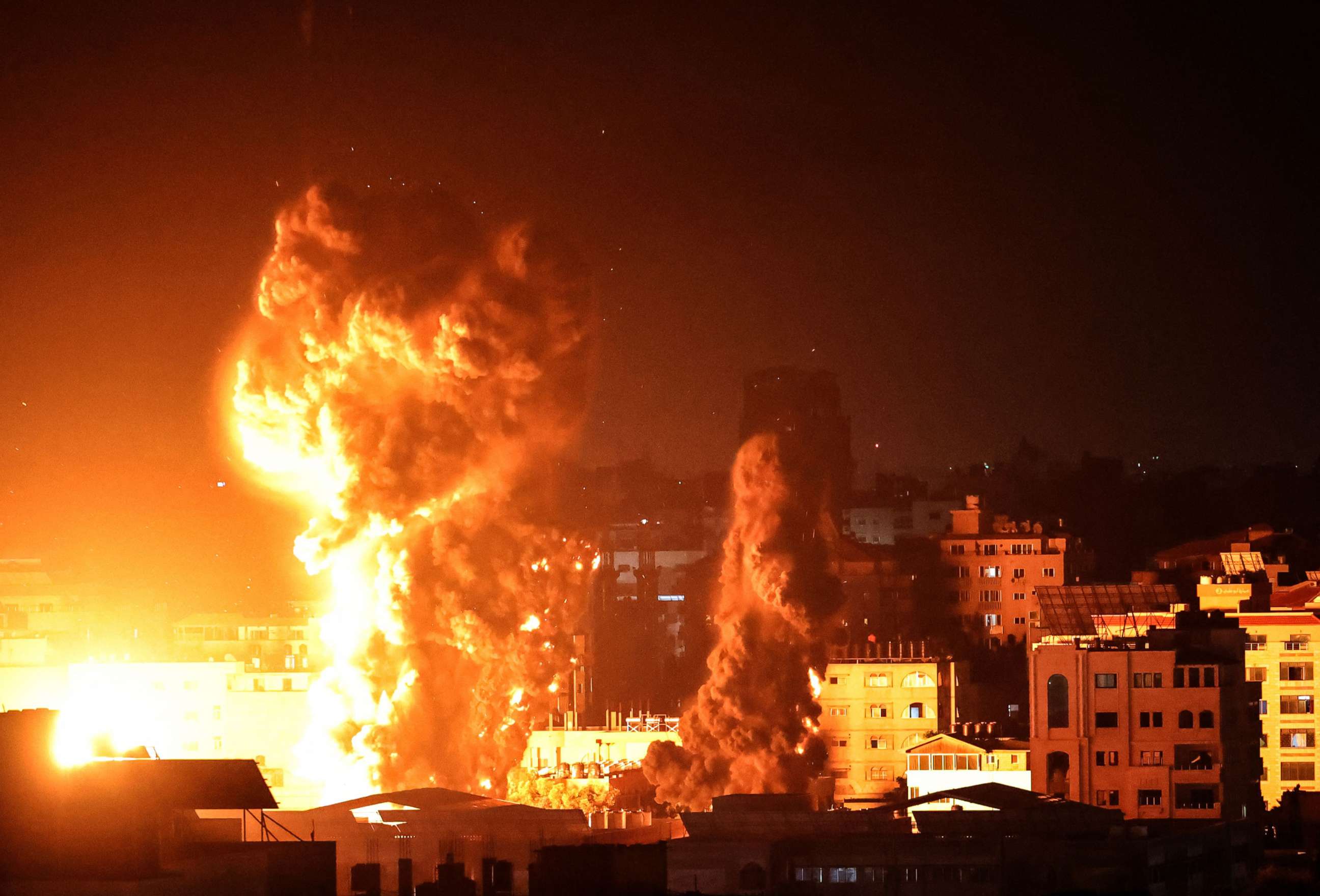
Gaza City resident Reyad Eshkontana told ABC News that an Israeli airstrike hit his home "without warning," killing his wife and four of their five children. Eshkontana and his 7-year-old daughter, Susie, were injured in the attack.
"They executed my family," Eshkontana said during an interview from his hospital bed on Sunday. "We are civilians, and my neighborhood was inhabited by doctors. There is no one from Hamas or anything."
Eshkontana recalled how the walls around them collapsed as their house fell apart, burying them in rubble.
"I was buried, my children were calling me from under the rubble and I couldn't do anything," he told ABC News. "My wife was silent."
Eshkontana said his only surviving child is "still shocked and can't speak."
"Her brother was killed on her lap," he said.
Raji Sourani, a Palestinian human rights lawyer in the Gaza Strip, accused the Israeli military of committing "flagrant war crimes" and said there's "big shame" on members of the international community who remain silent.
"It's time to hold Israel accountable in the international court," Sourani told ABC News.
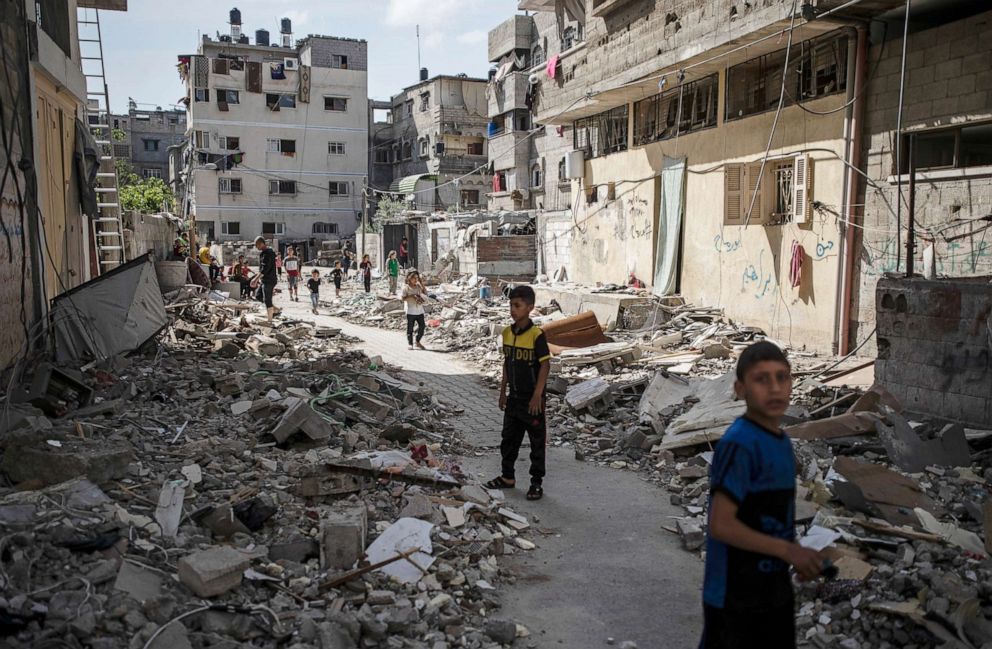
The United States has deployed a delegation to the Middle East to meet with leaders from both sides, amid growing fears that the Israeli military would launch a ground invasion of the Gaza Strip. Israeli Defense Minister Benny Gantz met with the U.S. delegation on Sunday, according to his office. Gantz told the delegation that the objective of the offensive is to restore long-term peace to Israel's borders and safety to its citizens. He said the Israeli military is taking every precaution to strike only terror targets and to avoid harming civilians, according to his office.
U.S. President Joe Biden had a telephone call with Netanyahu last Wednesday before speaking with Palestinian President Mahmoud Abbas on Saturday for the first time since taking office. But the Biden administration has given no signs of stepping up pressure on Israel to agree to an immediate ceasefire with Hamas, despite calls from some Democratic lawmakers. The U.S. ambassador to the United Nations, Linda Thomas-Greenfield, told an emergency high-level meeting of the U.N. Security Council on Sunday that the United States was "working tirelessly through diplomatic channels" to bring the fighting to an end.
Israel and the United States, Israel's closest ally, both consider Hamas a terrorist organization. The group aims to establish an independent Palestinian state that includes parts of modern-day Israel.
Palestinians want to include the Gaza Strip and the West Bank -- a landlocked territory bordered by Israel and Jordan -- in their future state, with east Jerusalem as their eventual capital. The U.S. government has voiced support for a two-state solution to the Israeli-Palestinian conflict, which would create an independent Israel and Palestine. However, former U.S. President Donald Trump recognized Jerusalem as Israel's capital in 2017 and relocated the U.S. embassy there from Tel Aviv in 2018, a controversial move that was welcomed by Israelis and condemned by Palestinians.
Jerusalem has long been a flashpoint in the decades-old conflict between Israelis and Palestinians.
Hundreds of thousands of Palestinians fled or were displaced from their homes during a war that accompanied Israel's creation in 1948. Some Palestinian refugees were rehoused in the Sheikh Jarrah neighborhood of east Jerusalem, just outside the Old City, by the Jordanian government in the 1950s -- before Israel captured the city from Jordan during the 1967 war, along with the Gaza Strip and the West Bank. Now, several Palestinian families are facing possible eviction from land that Jewish settlers claim they lost to Arabs during the 1948 war. Israeli law allows citizens to take back such land but it does not allow Palestinians to do the same.
On May 9, the day before Hamas and Israel began trading rockets and airstrikes, the Israeli Supreme Court decided to delay a ruling on the eviction case by up to 30 days after the attorney general requested more time to review.
ABC News' Nasser Atta, Guy Davies, Conor Finnegan, Ben Gittleson, Matt Gutman, Hatem Maher, Luis Martinez, Jordana Miller, Bruno Nota, Becky Perlow, Joseph Simonetti, Cynthia Smith, Sam Sweeney, Christine Theodorou, Karen Travers and Sami Zayra contributed to this report.